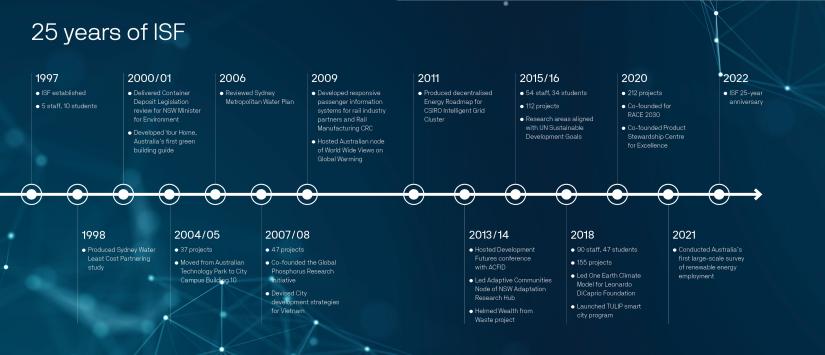Over more than 20 years, ISF has reshaped the sustainability conversation in Australia and internationally through the delivery of world-class transdisciplinary research.
In 1996 Dr Mark Diesendorf was appointed as the foundation director of the ISF. Bob Carr, then Premier of NSW, formally launched the Institute in 1997, during a crucial period in the history of global sustainable development
Five years earlier, the landmark Rio Summit of 1992 had identified sustainable development as a global imperative. In 1997, the same year as our founding, the Kyoto Protocol – with its mandatory targets for greenhouse gas emissions – was adopted. Just three years later, the UN would launch the Millennium Development Goals.
Combined, these policy and international development achievements represented a series of huge leaps forward towards a more sustainable future. It was against this backdrop that ISF emerged as a leading Australian voice in the global sustainability conversation.
From humble beginnings
As the first flagship research centre at the University of Technology Sydney, ISF was launched with only five staff and 10 postgraduate students.
ISF was the first research centre to sit beyond UTS’s existing faculty structure, a decision that laid the foundations for our uniquely transdisciplinary, futures-focused, impact-driven research approach. This approach draws together a wealth of academic and professional expertise across our 10 research areas, enabling us to deliver meaningful research and consultancy outputs that respond to global drivers of change.
Despite our humble beginnings, today ISF is a trusted international research and consulting leader in the field of sustainable development. We have a reputation for pushing the boundaries to produce world-class research at local, national and global levels.
Our research achievements
Over the past 20+ years, we’ve made an enduring commitment to building a better world. Many of our research achievements have left a lasting mark on the Australian and global sustainability fields.
Our major achievements include:
- 1997-2009: Pioneering methods in integrated urban water supply demand planning and drought response. These methods, which are now in use around the world, have resulted in hundreds of millions of dollars of program investment, the creation of new policies and regulations, billions of litres of water saved and major greenhouse gas reductions. Local examples of this include developing the strategy for Sydney Water Corporation to meet its operating licence demand targets, advising the Hawkesbury-Nepean River Management Forum on environmental flows and advising governments and utilities in each mainland state and territory on water supply-demand planning.
- 2000/01: Producing the first major green building guide “Your Home” to identify energy, material selection and water efficiency as critical components of sustainable building (Australian Greenhouse Office). Conducting the independent review of Container Deposit Legislation for the NSW Minister for Environment.
- 2008/09: Developing new energy solutions, including the Decentralised Energy Roadmap for Australia (CSIRO Intelligent Grid Cluster) and research for the Prime Minister’s Taskforce on Energy Efficiency.
- 2009: Developing responsive passenger information systems (Queensland Rail, Rail Manufacturing Cooperative Research Centre and Downer EDI) and using integrated resource planning to increase patronage on public transport (Queensland TRANSLink).
- 2010: Creating WASH guidelines for Southeast Asia and the Pacific (World Vision, Water Aid) to meet the water and sanitation needs of hundreds of thousands of people.
- 2014: Leading Wealth from Waste, a circular economy and resource productivity project to reduce reliance on critical resources and create new opportunities within the minerals and manufacturing sectors (CSIRO, five universities).
- 2016: Leading the Sydney Food Futures (Local Government NSW and Office of Environment & Heritage) project that modelled the impact of future urban growth on Sydney’s food production, which won an award for the Sydney Peri Urban Network of Councils (SPUN) in the Natural Environment Policies, Planning and Decision Making category of the 2016 Local Government NSW awards.
- 2018: Leading One Earth Climate Model (Leonardo DiCaprio Foundation), which showed that the 1.5°C target can be achieved by 2050 through a rapid transition to 100 percent renewables alongside a major conservation effort to increase the resilience of natural ecosystems and help ensure greater food security. It is the first model to achieve the required emissions reduction without relying on expensive or unproven technologies to draw down greenhouse gases out of the atmosphere.


